That is the opinion of Master Tran Duc Hiep (Director of Brand and Law Company Limited, Dai Quoc Viet Law Office, currently a Legal Advisor for a number of hospitals in Ho Chi Minh City) with Kinh te & Do thi Newspaper, revolving around the story of medicine and medical supplies that are still lacking today.

Lack of medicine and medical supplies at medical facilities is not a new problem. So, in your opinion, what is the main cause of this situation?
- In fact, there are many reasons leading to the shortage of drugs and medical supplies. Among them, the objective reasons are fluctuations in supply, scarcity of goods, and price fluctuations on a global scale, making the purchase of drugs, medical supplies, chemicals, and biological products even more difficult.
In addition, after the Covid-19 pandemic, the number of people seeking medical examination and treatment has skyrocketed, exceeding the capacity of medical facilities to supply drugs, chemicals, and medical supplies.
Regarding subjective causes, it is the limitation of supply due to slow licensing and renewal of circulation licenses; there is a mentality of apprehension and fear of making mistakes in organizing procurement, lack of human resources with expertise in organizing bidding; the progress of implementing drug procurement in the list of national centralized drug bidding, price negotiation and local centralized bidding is still slow; many small-quantity bidding packages do not attract suppliers...
Some people say that the Law on Bidding will take effect from January 1, 2024, but there is still no guiding circular, causing difficulties for medical facilities in bidding and purchasing drugs and medical supplies. From a legal perspective, what is your assessment of this statement?
- The Law on Bidding 2023 was passed at the 5th Session of the 15th National Assembly on June 23, 2023, effective from January 1, 2024.
Regarding the document detailing the application of the Law on Bidding, the Government issued Decree 23/2024/ND-CP and Decree 24/2024/ND-CP dated February 27, 2024 detailing a number of articles and measures to implement the Law on Bidding 2023 on investor selection and contractor selection.
To guide the preparation of bidding documents, documents requiring assessment, appraisal, reporting as well as general bidding processes for all fields, from February 2024 to April 2024, the Minister of Planning and Investment issued circulars such as 01/2024, 03/2024, 05/2024, 06/2024, 07/2024/TT-BKHDT.
Regarding the field of drug bidding and procurement, the Minister of Health issued Circular 04/2024/TT-BYT dated April 20, 2024, stipulating the principles, criteria for developing and listing national centralized procurement for drugs; issued Circular 05/2024/TT-BYT dated May 14, 2024, stipulating the list of drugs, medical equipment, and testing supplies subject to price negotiation and the process and procedures for selecting contractors for bidding packages applying price negotiation. The Ministry issued Circular 07/2024/TT-BYT dated May 17, 2024, stipulating drug bidding activities using state budget funds, health insurance funds, and other legal revenue sources of state administrative agencies on health and public health service units, including: Division of bidding packages and drug groups; Process and procedures for selecting drug suppliers; Centralized drug procurement.
Regarding the field of bidding and procurement of medical equipment (including medical supplies, chemicals, etc. according to Article 2, Decree 98/2021/ND-CP on management of medical equipment), the Minister of Health issued Circular 14/2023/TT-BYT dated June 30, 2023 stipulating the order and procedures for developing bidding package prices for goods procurement and service provision in the field of medical equipment, including: Procurement of medical equipment; Procurement of components, accessories, replacement materials used for medical equipment; Repair, maintenance, inspection and calibration services for medical equipment.
Therefore, the opinion that there is no guiding circular for purchasing drugs and medical supplies is completely incorrect. In theory, when a legal document is issued by the legislative body, it takes time for executive agencies and units to apply these specific regulations into practice. The issue of drugs and medical supplies is an extremely urgent issue for current medical examination and treatment, so in recent times, Government agencies and ministries have been very active in issuing detailed regulations and guidance documents.
In addition, medical facilities that are assigned to centralized bidding or facilities that are assigned to bidding need time to "absorb" the general regulations and separate regulations of the industry into their work. The drug bidding process also takes time, usually from the issuance of bidding documents to the selection of contractors, it takes at least 4 months, so I believe that the phenomenon of drug shortages in the coming time will gradually be overcome.
To stop hospitals from having to deal with the problem of medicine and medical supplies shortages, what do you think is the fundamental solution?
- To effectively solve the shortage of medical goods, we need to look frankly at reality, hoping to find solutions from there.
According to my observation, from March 2024 to now, there have been about 710 bidding documents for medical supplies and an estimated more than 700 bidding documents for drugs currently posted on the National Bidding Network, showing that the new bidding regulations are gradually coming into practice.
However, it is necessary to acknowledge the current reality that the regulations on bidding, bidding for the purchase of medical equipment, and bidding for drugs are extremely complicated. Therefore, members of the bidding document drafting team, appraisal team, and expert team must not only have good industry capacity (Medical, Pharmaceutical), have specialized knowledge of equipment, but also need to thoroughly understand each regulation in the Bidding Law, as well as the guiding circulars, so that they can confidently participate in the work of drafting, appraising, and evaluating bidding documents.
In addition, the pharmaceutical and medical supplies sector inherently contains high intellectual and technological content, and even has exclusivity in some types of machinery and brands, so it is not necessary to strictly apply the Bidding Law to find a unit that can supply medical supplies and accessories suitable for the hospital's available machinery. On the other hand, the same type of medical equipment has the same purpose of use, but each specialty and level of use has different requirements for technical parameters, technology application, etc. Therefore, purchasing units are still wondering how to avoid violating the competition restriction regulations when preparing bidding documents.
Therefore, I recommend that the Ministry of Health and relevant departments organize training sessions on medical bidding for individuals participating in bidding teams, appraisal teams, and experts. In addition, I encourage medical facilities with conditions to invite experts to consult on the Law on Bidding in Health. It is time for hospital legal work to be systematically implemented in public hospitals.
This not only helps doctors and pharmacists feel secure in doing their jobs, but also protects the legitimate rights and interests of medical facilities against contractors. I have participated in working sessions with a number of contractors, and it must be said that they are tense battles to ensure the rights of the hospital when the contractors also have their own legal team.
Thank you!
The Ho Chi Minh City Department of Health is urgently developing a drug import licensing process to meet special treatment needs arising during the medical examination and treatment process for medical examination and treatment facilities in the area.
I think this is an important step for the health management agency to systematize and codify many related regulations into a unified working process with guiding value applicable to health facilities.
Medical facilities are also actively developing their own hospital procedures. However, if the Department of Health has given specific instructions but hospitals still have a shortage of medicines because they do not have a bidding plan or do not conduct bidding, it is necessary to consider the responsibility of these medical facilities.
MSc. Tran Duc Hiep
Source: https://kinhtedothi.vn/can-tang-cuong-cong-tac-phap-che-nganh-y-te.html







![[Photo] Unique architecture of the deepest metro station in France](https://vphoto.vietnam.vn/thumb/1200x675/vietnam/resource/IMAGE/2025/11/14/1763107592365_ga-sau-nhat-nuoc-phap-duy-1-6403-jpg.webp)
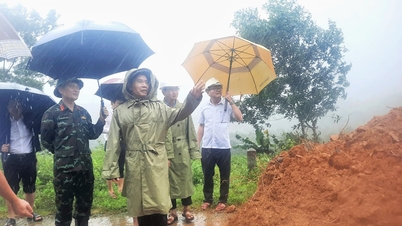

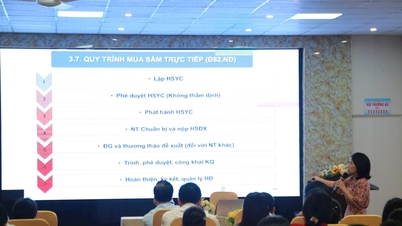




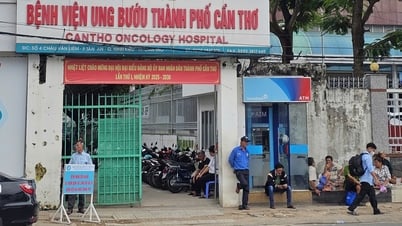

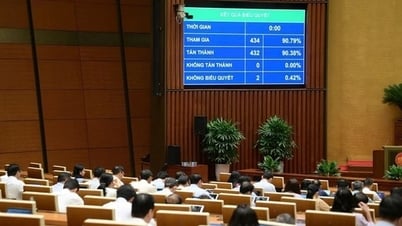
















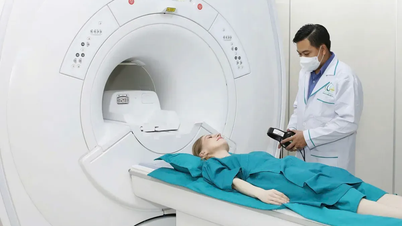
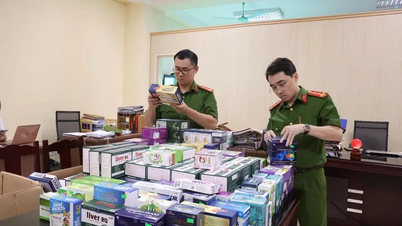




![[Photo] Special class in Tra Linh](https://vphoto.vietnam.vn/thumb/1200x675/vietnam/resource/IMAGE/2025/11/14/1763078485441_ndo_br_lop-hoc-7-jpg.webp)
![[Photo] Unique art of painting Tuong masks](https://vphoto.vietnam.vn/thumb/1200x675/vietnam/resource/IMAGE/2025/11/14/1763094089301_ndo_br_1-jpg.webp)







































































Comment (0)